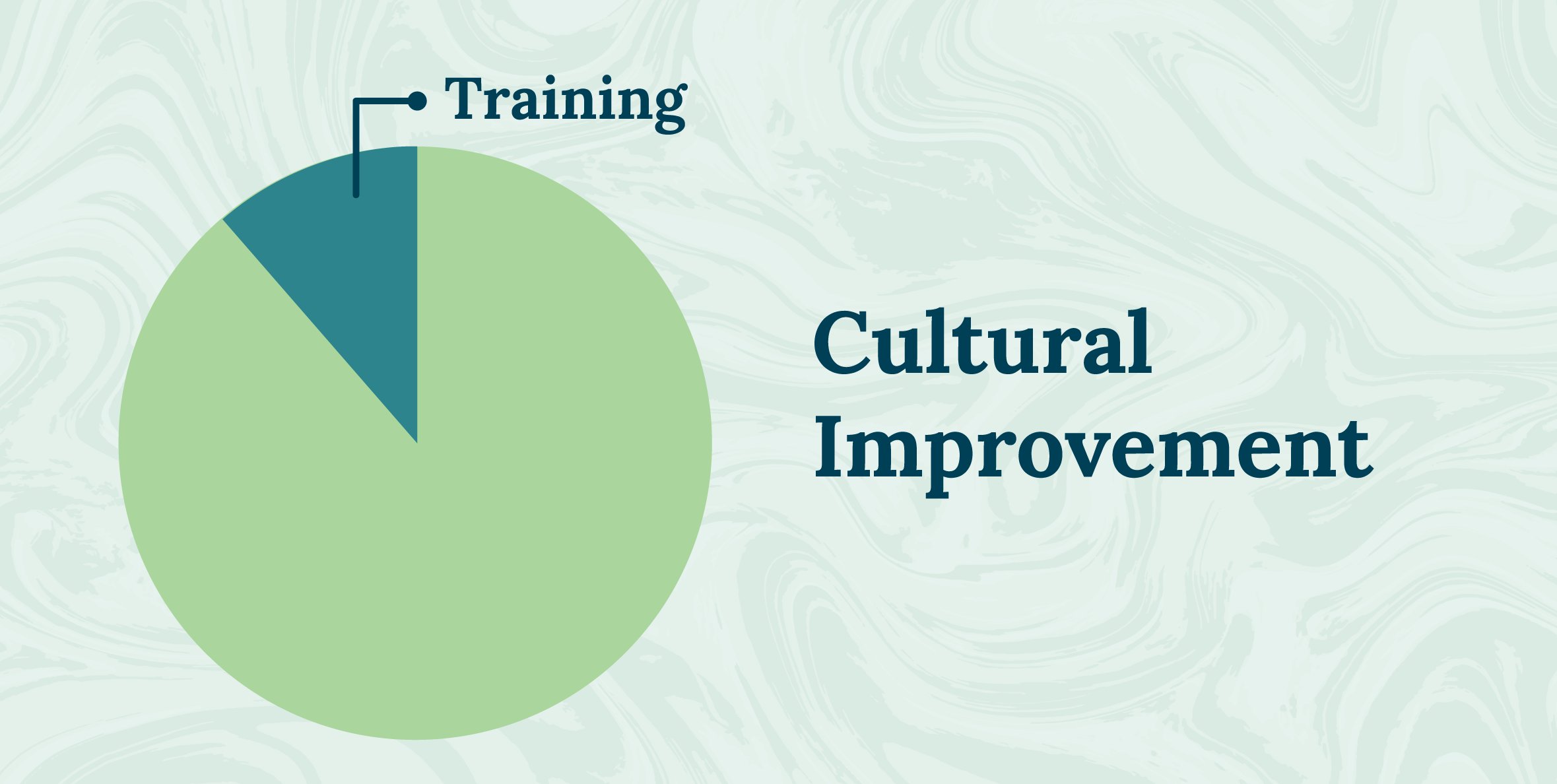Facing Reality – Why Training Can Feel Uncomfortable
Contributed by Jonathan Gonzalez and Tammy Bryant.
Most individuals who have worked for an organization for any length of time have faced the dreaded email or call from a manager letting them know the time has come to take a statutorily mandated harassment training course. Many of these courses are filled with required legalese, definitions and examples of straightforward behavior that will [hopefully] never apply to the learner. For this reason, employees across the country are put off by the very idea that work time should be consumed by patronizing “click-through” modules filled with cringe-worthy acting (at best) and forced humor (at worst).
If this type of education is familiar to you or your organization, it may raise a sense of discomfort to the manager who must assign the education to their team. Unfortunately, the outdated video is the wrong type of discomfort, and our research has shown to actually level with the workforce, an entirely different type of discomfort is necessary – that meaning the type that hits home and is derived from actual situations that have occurred within organizations.
At Syntrio, we have spent the better part of thirty years adapting real life scenarios and examples into courses that challenge traditional comfort and breadth. Indeed, at times, these scenarios have caused customers and prospects to comment that the material may appear offensive or even unnerving to their learners. We take feedback seriously and keep our finger on the pulse of our customer base. This means when a scenario or example is not having the impact that we would like for our customers it is reviewed and changed when needed. That said, there are times when it is important for the customer or prospect to consider whether their workforce’s offense to a scenario may be exactly what is needed. The purpose of this article is to examine why.

Harassment is Inherently Offensive
Harassment is defined as unwelcome conduct that is based on a protected category. It generally becomes unlawful where a) enduring offensive conduct becomes a condition of employment; or b) the conduct is severe or pervasive enough to create a work environment that a reasonable person would consider intimidating, hostile, or abusive. There are some strong terms listed in the legal definition of harassment, and creating content that pretends truly offensive behavior is not taking place in the work environment dismisses the reality that many employers are afraid to face. If the workforce is not educated on the type of behavior that is taking place in the modern work environment, they are undoubtedly likely to cringe, but not for the reason their employer may think.
Many examples in most harassment courses on the market involve overt acts such as aggressive gropes or direct catcalls. While these types of behaviors are virtually certain to lead to a claim of harassment and are, of course, offensive, in most cases, the behavior giving rise to a claim is much different and often subtler. In many cases, the conduct that amounts to a significant harassment case has no ill intent. For this reason, when a scenario appears shocking from our content team, it is directly adapted from a real case handled by Syntrio’s subject matter experts. After taking these matters now for many years and into the present, we know that trivialities do not resonate with the user. Indeed, when a scenario gets the workforce talking (and even complaining), there is a genuine opportunity for cultural improvement. After all, if the content is viewed and dismissed, the organization is only checking a compliance box and not allowing its employees the opportunity to discuss the material and scenarios (for better or worse).

Training is Only One Part of the Equation
Training is integral to cultural improvement, where employees get the education they need to gather the courage to speak up when they find behavior inappropriate. When employers listen to these complaints and begin to act on them, employees feel comforted that their concerns are being addressed. This is the next step of evolution toward a positive workplace culture. But if the education is not thought-provoking or stimulating, the employees are likely to dismiss it as only benefitting the employer’s compliance needs rather than for their benefit.
When a scenario makes employees uncomfortable to the extent they feel the need to speak with their employer about it, an opportunity for discourse about harassment arises. This is certainly not to say no line can be crossed in creating a training course, but the examples should be somewhat “uncomfortable” so as not to be dismissed. Where is the line? When a system includes overly violent or graphic descriptions of behavior that are in and of themselves inappropriate, we believe the line is crossed. In contrast, a scenario that may cause people to think and offend their sensibilities due to its subject matter will resonate with the user and even allow them to engage in discussion with a supervisor or member of leadership. Such examples provide actual value to organizational culture.
None of Syntrio’s examples are fictional, and none are included in a course to provide “shock value.” Instead, we carefully adapt our vignettes and scenarios from a near-endless cache of advice given to high-profile organizations on real-life harassment issues. All too often, metaphors and subtext are the sources of harassment claims. For this reason, it is sometimes necessary to include subtexts that can be offensive to some to get the point across. These scenarios and examples resonate with users and have an actual positive impact on corporate culture because they cause discourse among those who have taken the course and those tasked with leading and managing the workforce. While the themes addressed are serious, what better time to have that discussion than during a training exercise before something similar causes damage to both your organization’s business and the organizational culture at large?

DE&I Training
DE&I is a core foundation of a healthy workplace culture focused around alignment among mental and physical health and safety, civility and respect, harassment/bullying, and discrimination. Regardless of how you engage learners around DE&I, at the core, no roadmap or process dictates how learners are supposed to feel. Emotions do not follow logic, a timeline, or a predictable cycle. DE&I workshops and training around inclusive workplace practices, anti-racism, and pay equity affects us emotionally, but this work is unique. Thanks to social media, real workplace scenarios, and the always-on nature of the news, there is a present-day virality to the injustice that has increased the importance and urgency of DE&I issues.
So why are serious DE&I learning conversations challenging to kick off and sometimes even more challenging to sustain? Why are they often regarded as being steeped in the abstract rather than being viewed as absolute and actionable? And why do so many leaders and employees struggle to get honest DE&I conversations to materialize? One answer: discomfort.
It is common to believe the workplace is strictly for tasks, job responsibilities, and what is right in front of them: the work. When organizations avoid critical and honest conversations around real workplace scenarios, they still influence the workplace culture – whether we acknowledge them or not. Organizations can no longer afford to feel comfortable or take performative measures around DE&I training. Organizations should make DE&I training an ongoing, engaging process where learning is adaptable.
Syntrio has become a global DE&I leader by working closely with over 6,000 customers and taking a customized and comprehensive approach to DE&I solutions. Syntrio has made significant investments in learning as businesses shift from a compliance focus to an aspirational and sustainability mindset. We meet you where you are on your journey, enabling you to create a purpose-built DE&I curriculum that removes barriers and opens new freedom of self-expression in the workplace.
We invite you to speak with a staff member to discuss how we can benefit your organization through our library of courseware dedicated to cultural improvement. Our account executives are well-versed in Syntrio’s industry-leading methods of instruction. Our subject matter experts will guide you through crafting and developing scenarios to engage and better prepare employees when bringing their concerns to your attention. We believe this is the path to cultural improvement and making a difference, as opposed to run-of-the-traditional training that will check your compliance box but leave your workforce tuned out and with a bad taste in its mouth over lost productivity, and nothing gained.


